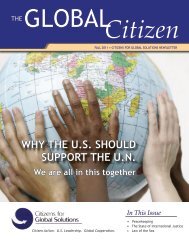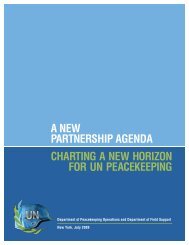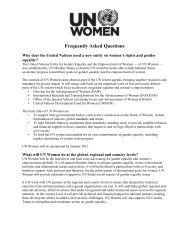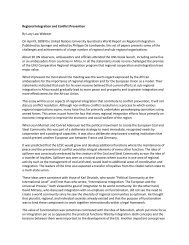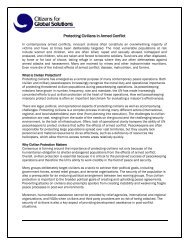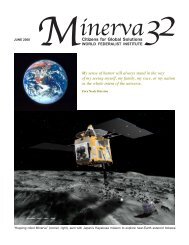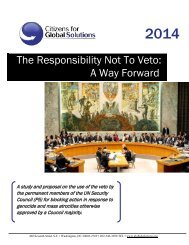Minerva, Fall 2011 - Citizens for Global Solutions
Minerva, Fall 2011 - Citizens for Global Solutions
Minerva, Fall 2011 - Citizens for Global Solutions
- No tags were found...
Create successful ePaper yourself
Turn your PDF publications into a flip-book with our unique Google optimized e-Paper software.
order — which they identify as “security,a healthy planet, and a healthfully heterogeneousglobal society” — can onlybe achieved through combined ef<strong>for</strong>t.In other words, if all of the world’s keyplayers deal with the international systemby trying to maximize their own nations’benefits and minimize their contributions,the world as a whole could face a prettybleak future.As a key to spurring a more civic-mindedattitude from nations and their leaders,the authors offer an alternative to narrowand short-sighted conceptions of nationalinterest: the principle of mutuality. Whenpolicy-makers mull tough diplomaticcompromises or tithes they might contributetoward global public goods, theyshould use an accounting system thattakes a long view. They shouldn’t expectrepayment or benefits of equal value, butshould instead trust that if everyone doeshis part, “an ongoing set of mutualitymoves will roughly balance out the accountsand leave us all better off than wewere”.The book’s concluding chapter highlightsfour major <strong>for</strong>eign policy dilemmas thatwill test America’s international strategy.To stress the importance of those toughchoices, the authors give their thoughtson the discipline of strategy: “Anybodycan tell a story about the world they wantto live in. Strategy is the discipline ofchoosing the most important aspects ofthat world and leaving the other stuff behind.”As they see it, the trickiest questionshave to do with the proper role ofnonstate actors versus official authorities;multilateralism as a false panacea <strong>for</strong>international challenges; populist pressuresdemanding more than democraticgovernance and free markets can deliver;and the difficulty of reckoning short-termcosts in light of long-term risks (think climatechange).Here’s how I would answer my openingquestion about how much the world haschanged: not as much as Jentleson andWeber say it has. The End of Arroganceworks very well as a provocation, yet theauthors’ insistence that we are back to thedrawing board of a new global order is abit excessive. Their report of the postwarorder’s demise is greatly exaggerated.While it may be overly complacent to assertthat “there is no alternative”, it’s alsotoo early to declare the old rules invalid.Indeed, one of the book’s most dramaticclaims is to declare the very notion ofrules to be passé. In keeping with the ideaof a relentlessly competitive, constantlychurning marketplace, the new internationalorder consists of a stream of intergovernmentaltransactions. As the authorsput it, diplomatic deals are taking theplace of international norms at the heartof the system.If they’re right, the world has been turnedupside down, and most of us in the <strong>for</strong>eignpolicy establishment failed to notice it —international politics as a new global WildWest. Can that be right, though? I don’tthink so. It’s one thing to face up to thepolitical strains that indeed jeopardize thenorms put in place over the last 65 years,and yet another to declare that the old rulebooks have gone out the window.When Weber and Jentleson describe anew political system in which each nation’spolity and social order are beyondthe bounds of international relations, youhave to give them credit <strong>for</strong> practicingwhat they preach about strategic disciplineand abandoning secondary concerns. Inone section, they try to get a jump on theircritics with a preemptive defense againstcharges of betraying moral values. Theauthors insist that they fully share the valuesof liberty and democracy. It’s just thatthe authors’ own views — and by extensionthose of the American leadership andpublic — do not represent the weight ofinternational sentiment and there<strong>for</strong>e donot set the terms <strong>for</strong> the global politicalorder. As a matter of political assessment,they see only enough consensus amonggovernments <strong>for</strong> them to deal with oneanother as equally sovereign authoritiesin the international arena. Governanceprinciples <strong>for</strong> how they act within theirown borders are too divisive and controversialto serve as a basis <strong>for</strong> internationalorder.In such a system, would the United Statesbe compelled to back Hosni Mubarakto the bitter end? End of Arrogance waspublished be<strong>for</strong>e the recent protests in12 • <strong>Minerva</strong> #39 • November <strong>2011</strong>Egypt, but the book says enough aboutthe hazards of getting involved in others’governance to allow <strong>for</strong> some extrapolation.Jentleson and Weber’s view doesn’tnecessarily imply unstinting support <strong>for</strong>a dictator faced with mass discontent.Given their emphasis on political realities,it would be surprising if the authorscalled on US policy-makers to ignore thewriting on the wall. Machiavelli himselfwould have recognized that Mubarak wasneither loved nor feared enough to retainpower.On the other hand, the authors’ viewsseem to align them with the series of USambassadors in Cairo who counseledagainst any serious pressure by Washingtonon Mubarak to re<strong>for</strong>m Egypt’s politicalsystem. In other words, I interpret thebook as an argument <strong>for</strong> giving Mubaraka shove at the end, but not laying afinger on him be<strong>for</strong>e then. Among theircomments on democratic principles, theauthors remind us of the long record ofAmerican hypocrisy — the dictators supported,the democratically elected governmentsoverthrown. And remember,among their tenets of the marketplace ofideas is that a nation must be consistent toremain credible, given the market’s highdegree of transparency. The apparent answeris to give up any pretense of defendingdemocratic principles abroad.Given the scope and speed of change intoday’s world, it is highly useful to havea book that keeps us from being too com<strong>for</strong>table.US <strong>for</strong>eign policy indeed confrontshard choices and trade-offs andmust do a better job in wrestling withthese dilemmas. Yet I have to ask whetherthis framework has boxed us in more thannecessary. Must the discipline of strategybe so stringent that second-tier concernsbe jettisoned rather than kept in proportion?Just because the norms of the oldorder have come under significant newskepticism and resistance, does that meanthey are null and void? Does the globalmarket demand such consistency that internationalpublics cannot understand thecompeting pulls of democratic principles,stability considerations, and power realities?[continued]



